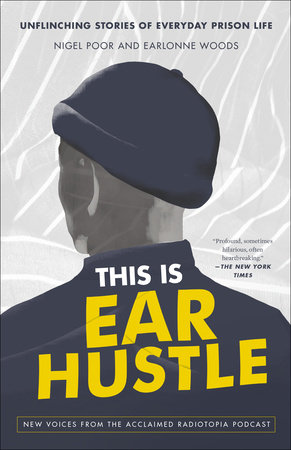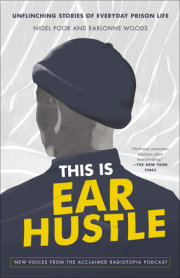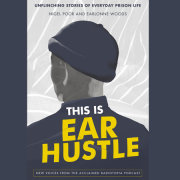Chapter One
EarlonneI grew up in the late 1970s in South Central Los Angeles in a two-parent home with my older brother, Trevor. My mother, Alyce Faye Woods, worked for the post office. My father, Walter Earl Woods, was an alcoholic who hustled in the streets and never really had a job. We only interacted when I was in trouble. He never played with me, never watched me play sports, never talked to me, never helped me with my homework—but he’d fasho whoop my ass . . . like I wasn’t learning what he was teaching.
Trevor and I fought a lot—as brothers do—but he was also my protector. He was four years older, so my parents always left him in charge. To him, that meant he owned me and had the right to beat me up as he pleased. I’d always be the one crying after a round of fisticuffs. One time he beat me up badly enough that I was hungry for revenge, so I conceived of a plot to get back at him. I paid close attention and observed his routine when he was watching football. He’d lounge on the couch until the commercials came on, at which point he’d always get up to do something. Every time he ran back to the couch—without fail—he’d do a swan dive right into his pillow, headfirst . . . Hmm. At the next opportunity, I was prepared. As soon as he got up, I quickly removed the pillow from the case and shoved a typewriter in its place, fluffed it, then ran outside. I watched through a crack in the door as the game came back on and, true to form, he did his swan dive head-first into the couch. POW!
“AHHHHOOOW!!! Um’ma kick yo ass!”
Chalk up a victory for the little guy.
When I think about some of the earliest contributing factors in my introduction to crime, I go to 1978 and ’79, when my brother would sneak into my parents’ room when they were sleeping, and quietly bring our dad’s pants out of the room. He’d rifle through, take a dollar or two, and give me fifty cents, which I earned by being the one to creep back in and put the pants back. I’d use my fifty cents to buy as many boxes of Lemonheads, Now & Laters, or sunflower seeds as I could afford. I’d sell a ten-cent pack of Now & Laters for a quarter at school, and be the man that day—I was a hustler before I even knew what that meant.
Parmelee Avenue Elementary School, where I went from second through sixth grade, was located in the heart of my neighborhood, on the east side of South Central Los Angeles. School interested me—not the education aspect so much as the getting-in-trouble part. I was embarrassed throughout my time in elementary school, because my classmates could read but I couldn’t. Due to lack of practice or desire, I didn’t really learn how to read until closer to junior high. Maybe it was a defense mechanism, but the class clown mask fit me perfectly. Plus, I was a magnet for trouble.
I took note of the fact that one class got out of school at 12:30 p.m., while the rest of us got out at 2:15. I investigated how I could get into that class and, after a few weeks of plotting, I too was getting out at 12:30. I had played myself into the special education class, and I was damn proud of it. The schoolwork was easy and no one else could read either. Unfortunately, my mother caught wind eventually and voiced her concerns. As a result, I was shipped to an after-school learning center called Kedren, where they sit you down with private tutors. Awww man . . . I f***ed up.
During lunchtime, you’d get a tray and slide it down the conveyor, telling the cafeteria worker what you wanted. I guess there was a sign somewhere declaring “YOU MUST EAT EVERYTHING ON YOUR PLATE,” but I sure couldn’t read it. One day, I left some untouched spinach on my plate, and the staff told me that if I didn’t eat it I’d have to go to “the box”: a room with nothing in it but a mirror. So there I was, standing in this tiny room that was about the size of a school bathroom stall, looking at myself in the mirror. Bored, I took out my house keys and carved my name in the wall. My mother had to come get me and, when they told her that I had carved my name in the wall, I insisted that they were lying—I did no such thing! They gave me every opportunity to tell the truth, but I stuck to my story.
That was the first time I learned about mirrors you could see through. They literally led me to the other side. Wow. They had watched me do it. They showed my mother where I had written “KAOS” (my nickname for a while). There was drywall dust on the floor from the carving—shit, it was probably still on my keys too—but I held my ground, stubbornly. My only response was to keep it real, claiming, “I didn’t write on no wall.”
When I wasn’t making trouble in school, I was playing park ball. Our sponsors were the local county sheriff’s department. It was all about community. There were Black detectives from the Firestone Park Station who spent their off-time coaching and mentoring the youth in the neighborhood. As a youngster I really looked up to police officers—those guys were involved in my life. I came to know them well. Myself and other local kids used to go up to their offices and hang out with them. If they were ever driving through the neighborhood and saw us, they would often pull over, jump out, and just have a conversation with us. I respected them.
That all changed when I was nine years old. I was at Roosevelt Park leaving the swimming pool. Across the street, on the railroad tracks, a long train of “K” Line containers followed by hot dog–shaped chemical tanks went rolling by. The caboose passed and I watched the train go down the track for about a mile, but the railroad crossing gates never lifted. Cars started driving around the guard gates, so I did what I’d done before: I lifted one of the train-crossing arms to let cars go by. Motorists seemed to appreciate my gesture, though not trusting a nine-year-old’s judgment, the drivers all looked both ways to make sure a train wasn’t coming.
About four or five minutes later, a couple of sheriffs I didn’t know pulled up and yelled at me to put my hands on the hood of their car. I let go of the gates and followed their instructions. They rifled through my shorts pockets, put me in handcuffs, and placed me in the back of the police car. None of the drivers stopped to see why they were messing with me. And initially, I truly thought they were just playing. But then both of the officers got in the car, closed the doors, and told me I was going to jail. I started crying immediately, but they just ignored me. On the way to jail, they got a call about a local disturbance, so they took me on tour to some grocery market. While they were in the store, I sat in the back of the police car as people walked by, looking at me as I bawled my eyes out, hoping someone would just open the door and let me go.
When we finally made it to the sheriff’s department, they put me in a cell with nothing in it. I was terrified. I had to pee, so I started knocking on the door as officers passed by, asking if I could please use the bathroom. They all ignored me, like I wasn’t their business (as if I were not nine years old). I had to go bad, but I didn’t want to get in trouble for peeing on the floor. Left without any other choice, I took off my checkerboard Vans shoes and urinated in them. That was the only thing that made sense to me.
I stayed in that holding cell all day. They couldn’t reach my parents; my mother was at work and my father was in the streets. I gave them the only phone number I knew by heart, for my Auntie Donzell, my mother’s older sister. The sheriffs eventually dropped me off at her house, about three miles away. I don’t remember what she had to say about it. I only remember my father’s words the next day, when he came to get me: “You know um’ma beat your ass when we get home.” He had nothing to say to me except those words. Tears started falling. He never once asked me what had happened. All he needed to know was that I’d been arrested.
I had to show up with my family in juvenile court, because—as I would learn—lifting those guardrails is a federal crime. I genuinely thought I was being a Good Samaritan. To make it far worse, I discovered in court that those sheriffs had lied about me, claiming I was charging each car a dollar to go by. I didn’t have a penny on me when they took me into custody.
Weekends as a kid were times for tuning into Kung Fu Theater. I remember a specific Monday, when my friend Julian “JuJu” Arnold and I were sparring, doing our rendition of karate and pretending to be Bruce Leroy. I must have karate-chopped JuJu too hard, because suddenly we started American fighting. He had a gang called the JuJu Gang, so after I fought him I had to fight the rest of them, one at a time. I performed righteously—mainly because of all the experience I had fighting off my older brother. JuJu and I both got suspended from school, but our fight didn’t stop us from being friends.
Copyright © 2021 by Nigel Poor. All rights reserved. No part of this excerpt may be reproduced or reprinted without permission in writing from the publisher.







